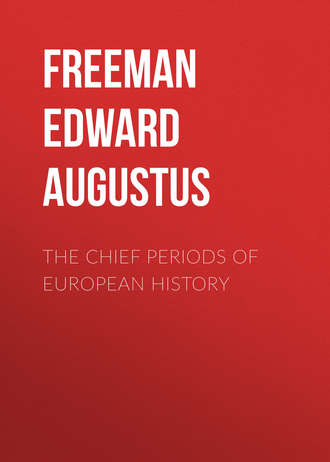
Freeman Edward Augustus
The Chief Periods of European History
GREEK CITIES UNDER ROMAN RULE
I have in various forms tried to point out the special importance which, in the history of the world, belongs to the period which saw the establishment of the dominion of the Roman People over the civilized world of its time, especially over the Hellenic and hellenized lands round the eastern Mediterranean. It is of the first importance for the right understanding of general history to take in the real character of the state of things which was brought about by this gradual establishment of the Roman dominion. It is curious to see how constantly that state of things is misunderstood, from looking at the matter with modern eyes. And it is the more curious when we come to think how very modern the eyes must be which are unable to see the matter correctly. For we have hardly to go out of our own century to find lively images of the state of things which Roman conquest brought about. Yet we are constantly tempted to fancy that the rule of the early Roman Emperors, perhaps that of the Roman Commonwealth before them, was a centralized administration, in which all authority issued from a central power. We are used to the great kingdoms and commonwealths of modern Europe, in which local bodies may enjoy a greater or less degree of local independence, but in which they hold that independence in inherent subordination to the central authority, by virtue of laws passed by the central legislature. The land is divided into counties, departments, provinces, administered according to such rules as the central legislature may think good to lay down. It is true that in our own country the shire is, both in idea and in part of the land in historical fact, older than the kingdom. But in a large part of England the shire is as truly a division of the kingdom as a French department, and where it is not so historically it has become so practically. An English shire, an English borough, has no rights or powers but such as it has derived, in some shape or another, from the central power of the land, by act of Parliament or by royal charter. That central power has the same rights and powers in every corner of the kingdom. I speak of course only of the United Kingdom; as soon as we get beyond its limits, as soon as we enter the Scandinavian kingdom and the Norman duchy which lie so near to it but which form no part of it, so soon we still find ourselves in a state of things which has much in common with the Roman dominion. And if all this is true of the United Kingdom, it is yet more true of states like France and Italy, whose geographical divisions and administrative system have been drawn up as something wholly new in quite modern times. Yet down at least to the end of the last century, in many parts of Germany, of Italy, of Switzerland, of all the lands to which the power of Venice reached, the endless varieties of alliance and subjection between different towns and lands presented the closest analogies to the relations of which I have now to speak. Survivals went on even to our own time. In 1865 a small district was still held in condominium by the two free cities of Lübeck and Hamburg. I passed through it with a feeling as if I had been carried back into some distant age. I presume that since 1866 things are different there.
It is of course perfectly true that, at a later age of the Roman dominion, when the Empire began to change into an acknowledged monarchy – though monarchy is not the proper word for a power which was often held by two or more colleagues – that Empire did come much nearer to the character of a modern centralized state. It was mapped out into administrative divisions, and those divisions were administered according to a general law. But the dominion of Rome, Commonwealth and Empire, had been in being for several ages before this change took place. The elder Roman rule was not the rule, despotic or constitutional, of a man over an united territory; it was the rule of a city over other cities and lands, cities and lands standing to the ruling city in every possible relation, from nominally equal alliance to a subjection hardly better than bondage. That so it should be was the natural result of the way in which the Roman dominion was formed. With the political ideas of the third and second centuries before Christ no other state of things was possible. The way in which the dominion of Rome was formed, the process by which the cities and lands of so large a part of the world passed under the supremacy of one ruling city, has much in common with the further process which the growth of that dominion made inevitable, the submission of Rome herself to the dominion of one or more of her own citizens. In both cases the change was gradual. People often talk of the change from the Republic to the Empire, very much as they talk of the English Reformation, as if it were a definite act which took place in some particular year. Yet all that was characteristic in the Imperial power arose out of its gradual growth, its growth through an union of magistracies and extraordinary commissions which virtually bestowed supreme authority on their holder. Above all, out of the original character of the Empire as an extraordinary commission granted by a vote of the Senate came the fact that the Empire remained for ages without any law of succession. A law prescribing a mode of election and a law prescribing a rule of hereditary succession both assume an ordinary office which must be filled by some one; the Empire was in its origin an extraordinary office which might not be filled at all. A vote, or several votes, of the Senate entrusted a single citizen – or more than one citizen – with powers which practically amounted to sovereignty, and which in the end grew into acknowledged sovereignty. But that growth was slow. For a long time after the Empire began, the republican constitution, the republican magistracies, the republican assemblies, still lived on untouched in their outward framework. They had simply lost all living energy through the growth of a power greater than all, a power which sometimes directed their course of action, sometimes itself acted in their stead. If we could conceive, as once or twice did happen for a short time, the controlling power removed, that is, if the extraordinary commissions which made up the Imperial power were not granted to any one, the old elements of the commonwealth were there, able again to act for themselves as of old. The Senate, after ages of utter nullity, actually did act again as an independent body when the Goth was at the gates of Rome and the Emperor was far away at Ravenna. For Rome once more to act without her master there was no need to create any new power, but simply to take the fetters off an old one. In the earlier ages of the Empire, when the old traditions were more lively, when the forms of the old constitution were still observed, such a change would doubtless have been far more easy. A modern kingdom cannot be changed into a republic without an active change in its constitution. The executive authority must be vested in some new power to be created and defined for the purpose. The Roman Empire might have been turned back into a republic by a purely negative change. All that was needed was not to appoint an Emperor. The various powers of the State which had left off acting or had come to act only as the Emperor bade them, would doubtless, from lack of practice, from change in all surrounding circumstances, have found it practically impossible to act as they had done in the days of the old commonwealth. But there would have been no formal hindrance to their so doing; there would have been no need to clothe Senate or magistrates with any powers beyond those which they still held, though in a dormant state.
The power of Rome over her allies and dependencies during the Commonwealth and the early Empire was very much of the same kind as the power of the Emperors over Rome herself. It was something which overshadowed a crowd of old powers and liberties, which brought them down to practical nullity, but which in no way formally abolished them. The republican institutions of Rome under the early Empire, the constitutions of the allied states, of the dependencies, even of the direct subjects of Rome, under both the early Empire and the Commonwealth, were much in the same state as a man or a beast that is fettered or bridled. His inherent physical powers of action are not lessened; only they cannot be exercised, or can be exercised only according to the will of a master. So it was with Rome herself under the Emperors; so it was yet more strikingly with the dependencies of Rome under Rome republican or imperial. As Rome herself submitted only gradually to the rule of her Emperors, so the dependencies of Rome submitted only gradually to the rule of Rome. There could hardly have been one Roman province in which, as in an English county or a French department, every inch of soil stood in the same relation to the central power. Within the geographical bounds of most provinces, above all within the bounds of the Greek and hellenized provinces, there were cities and districts standing to Rome in all those endless relations which were the natural result of the different times and the different circumstances under which their connexion with Rome began. Here was a free and equal ally of Rome, a city which Rome had been glad to receive as a free and equal ally at a time when her alliance was really valuable. Nothing had happened to give any excuse for dragging down the old ally to any inferior position. In theory she was still as free as ever, keeping every power of a sovereign state within and without. No Roman magistrate had any authority within her territory; if she sent offerings to Rome or to Rome’s master, if she supplied a contingent to a Roman army, all was the gift of pure friendship from one equal ally to another. A neighbouring town might be in the strictly provincial relation; over her soil the Roman people had become, not only sovereign, but landlord; she might keep her old municipal constitution, but it was purely by the grant or sufferance of the ruling city. Such a city yielded obedience to Rome, because Rome was an acknowledged mistress; if its free neighbour practically yielded obedience to Rome no less, it was simply because, in an alliance between the weak and the strong, the strong will always give law to the weak. And between these two extremes there were endless intermediate shades. Besides the absolutely independent ally, there were allies who also had treaties with Rome, but whose treaties were less favourable, treaties which bound both sides alike, but which formally placed one of the contracting parties in a higher and the other in a lower position. Again, there were towns of the province itself on which Rome had bestowed, not by treaty but by her own grant, higher rights than the rest of the province. One city was free, keeping its own law, exempt from the ordinary jurisdiction of the Roman governor, paying no tax or tribute to Rome, but holding all these privileges by grant from the Roman state. Another was equally free within its own walls, but bought its privileges by the payment of tribute to Rome. And as there were within every Greek-speaking province spots which remained spots of free Hellas abiding in their old freedom, so there might be other spots which were transplanted fragments of the soil of Latium or of Rome itself, keeping in the foreign land the rights of Latium or of Rome. That is, there might be within the bounds of the province Latin or Roman colonies, or towns to which, without being in their origin Latin or Roman colonies, Rome had thought good to grant, sometimes her own full citizenship, sometimes only the half-citizenship of Latium. Of these, the free and allied city, the Roman and the Latin colony, were geographically within the province, but they were not legally part of it. To the Roman and the Latin colony we have nothing exactly answering in modern Europe; but Andorra and San Marino are still lively illustrations of the position of a small state which has powerful neighbours. San Marino, a perfectly independent state, but which, as wholly surrounded by its great neighbour, is practically cut off from exercising any of the external powers of an independent state, is in exactly the position of a free and equal ally of Rome. Such an ally might keep perfect internal freedom, but it was in the nature of things cut off from any foreign policy. Andorra, a dependent and tributary state, though keeping full internal freedom, would, if it had only one protecting lord, also have its parallels among the dependent allies of Rome. But, in the complication of mediæval relations, Andorra has two protecting lords, two receivers of tribute. That was a state of things which could not be in the days of the Roman Peace.
There is only one San Marino within the geographical bounds of Italy, and San Marino is not one of the great cities of Italy. It is therefore a harmless political curiosity, with whose rights the Italian kingdom has no temptation to meddle. It might be otherwise if the kingdom had many such independent towns and districts within its borders, and if any of the great cities of Italy were reckoned among them. Now one of the ugliest features of Roman history, one which comes out in every page of the history of the second century B.C., is the ungenerous way in which Rome treated her independent allies the moment they ceased to be useful to her. As long as they served as checks on some other power, so long they were made not a little of; as soon as the dangerous power was overthrown or humbled, the ally which had helped to overthrow it became an object of Roman jealousy. The friendly power whose day of usefulness was over was exposed to endless attempts on the part of Rome to weaken and break it in pieces. Such is the tale of the kingdom of Pergamon, of the city-commonwealth of Rhodes, of the confederation of Achaia. No part of Roman history is more disgraceful than the dealings of Rome with those three states, the model governments of their several classes. No learning, no eloquence, can avail to whitewash the faithless and brutal dealings of the Roman Senate towards powers whose only fault was to be weaker than Rome and to have done good service to Rome. This feeling of jealousy towards the allies lingered on long after all ground for jealousy had passed away, when the free city was free only within its own walls, and could not lift hand or foot against the mighty ally by whose dominion it was hemmed in. But the wrongs of these cities under Roman rule were far more largely due to more immediate causes, to the overbearing love of power, to the baser love of gain, which formed the dark side of the Roman character. The liberties of these weak states were often encroached on, not only by the Roman state itself, but by particular Roman magistrates, and even by powerful men who were not at the moment magistrates. The establishment of the Empire undoubtedly did something to check the oppressions of the Roman governors, on whom there was very little check under the commonwealth. But if the Empire led to less oppression on the part of the representatives of the central power, it led to more meddling on the part of the central power itself. A man placed at the head of the world stands in a different position from a city placed at the head of the world. To the ruling city the dependent states are simply dependent states; it gets what it can out of them, but it has no temptation to meddle for the sake of meddling. The ruling man has temptations to meddle, and it may even be that, the better disposed he is, his temptations to meddle become greater. The natural tendency of the Empire was to unity and centralization everywhere and in every way. Under imperial rule, the endless variety of relations among the allies, dependents, and subjects of Rome gradually changed into the one character of direct members of the Roman Empire. But the change was slow. Sovereign commonwealths sank into municipalities, and municipalities sank into something less than municipalities, by mere force of circumstances, without any formal act. It is often very hard to say when this or that free city finally lost its distinct being through absolute incorporation in the Roman Empire. It is certain that the memory of past freedom, as something that still was not wholly past, lived on for ages. Under the early Empire the commonwealths of Greece and Asia, whatever was their formal relation, were in practice, not only subject to the Roman Empire, but very much at the mercy of the governors of the provinces within which they geographically lay. But they still were commonwealths, though dependent or even subject commonwealths. Their senates, assemblies, or other ruling bodies, had practically sunk to the functions of town-councils, and they were open, in a way in which an English town-council is not, to the caprice of an external power. But they were town-councils which had been sovereign parliaments. Some of them were in theory sovereign parliaments still. And even those which were furthest from that character, the councils of those towns which were neither free and allied states, nor Roman colonies, nor in any way privileged above the general provincial relation, had not wholly lost their original character. Deep into the time of the Empire, the old character of the Roman dominion, that of a city ruling over other cities, still left its traces. In such a state of things the authority of the councils or assemblies of the subject states might practically be smaller than that of the town-council of an English borough. That is, the assembly might be afraid of acting in any matter of importance without the leave of the central power or its representative. It might practically confine its action to matters of routine and ceremony, at most to votes of honours and setting up of statues, because any bolder action would awaken Roman jealousy. That is to say, the free and allied state could in theory do everything, even the provincial town could in theory do many things, according to its own free will. But generations of submission to an irresistible neighbour had taught it not to exercise that free will except according to the higher will of the power which was supreme over all. If the rights of the subordinate state became formal or even null, it was because they were wide and indefinite; they were the powers of a community which still kept a distinct being, but which was placed under the irresistible influence, sometimes under the direct dominion, of a stronger community. This is a position altogether different from that of a town or district in a modern kingdom or commonwealth where every part of the land has equal rights. In such a kingdom or commonwealth, whatever powers, great or small, this or that board or council has, are held according to the law of the land. As long as those powers are exercised according to the law of the land, no administrative interference is to be feared; if the law is broken, if the local authority steps beyond its legal powers, the wrong will be made good, not by an arbitrary will, but by a legal process. It was wholly different with the cities of which we speak, whether free, dependent, or subject; they were still separate commonwealths with inherent rights, even if those rights could no longer be exercised; their assemblies had once been parliaments, and to both the forms and the feelings of parliaments they still clave. And one city at least among the allies of Rome kept its substantial freedom down to an age when many fancy that the Roman power itself had altogether vanished from the earth. The freedom of Cherson was overthrown, not by Mummius in the second century on one side, not by Vespasian in the first century on the other, but by the Amorian Theophilos in the ninth. Till that day the last of the Greek commonwealths lived on its ancient life, and for the simplest of reasons. Not only the Emperor himself, but the proconsul of Achaia, of Macedonia, or of Asia, could at any moment encroach on, the Emperor could at any moment destroy, the freedom of any Greek city that lay geographically within those provinces. He had always the physical power to encroach or to destroy; not uncommonly he had the will. But the commonwealth which lay far away in the Tauric Chersonêsos stood in another case. The faithful ally could not be changed into the helpless subject, except by the same kind of effort which was needed for a Gothic or a Persian war.
The long abiding independence of Cherson is a fact to which I have often had occasion to call attention from other points of view. So is the independence of the Lykian League, though the less favourable geographical position of that power allowed its freedom to come to an end eight hundred years sooner than the freedom of Cherson. I have elsewhere spoken of that League as perhaps the most skilfully planned example of a federal constitution that the elder day could show;[2] it concerns me now as an example of the degree of independence which a considerable territory could keep under the general supremacy of Rome, from the fall of Perseus to the reign of Claudius. For the story of its origin we have to go to the narrative, unhappily fragmentary, which Polybios gives of the events which led to the deliverance of Lykia from Rhodian rule;[3] for a full account of its constitution we have only to turn to the description of Strabo.[4] It is specially instructive when the geographer tells us that the League still kept the right of war and peace, though, he adds, in his day that right could not be exercised at all, or could be exercised only as Rome thought fit.[5] After reading this, it is certainly curious to read the comment of a recent scholar who thinks that the powers of the League and the measure of its independence were something like those of the city of London.[6] A nearer analogy might surely be found in the relations in which many of the smaller powers of Europe stood not very long back; it is not very unlike that in which some of them stand at this moment. The position of Lykia towards Rome is very like that in which various Italian and German states stood towards Austria forty years back. It is very like that in which Servia at this moment stands to Austria and Montenegro to Russia. It is in short the position of a “protected” state, whether the protection be avowed or only practical. But there is this important difference. A protected state now has at least some voice in choosing its protector; it can exercise the old Teutonic right of seeking a lord. And a small state may even keep perfect independence without any protector at all, simply through the jealousies of the greater powers. A small state may sometimes live on in perfect freedom surrounded by powers stronger than itself. Any one of them could at any moment put an end to its freedom; but none of them is likely to make the attempt, because the others, for their own ends, will not allow it. But Rome stood alone in the world; there was no choice of protectors; whatever independence was left was held only by Roman sufferance. Whenever it suited Roman policy or caprice to extinguish the independence of any state, the thing was done.
The Lykian League, as embracing a considerable territory, has, from its geographical side, more in common with the kingdoms and principalities which lived on under Roman vassalage, than with the single city-commonwealths which supply the examples which most naturally occur to us. It must have been beyond the power of any single proconsul in a peaceful time seriously to interfere with the liberties of Lykia. It is true that the federal states of Greece still lived on for Pausanias to see them at work; and two generations earlier the sacred convocation of the Amphiktyons had drawn a new life from the measure of redistribution ordained by the Emperor Augustus.[7] But we may be sure that no confederation of old Greece kept anything like such a measure of political life as that which Strabo saw at work in Lykia. What little life there still was in the Greek world abode in the single cities, and there was doubtless more life among the Greek cities of Asia than in those of old Greece. Of Lykia in Strabo’s day we have only Strabo’s general description; we have no detailed illustrations of the working of the political system; least of all have we any speeches, any letters, any political treatises, either from Lykian orators or philosophers or from Roman magistrates who had dealings with the Lykian League or its cities. Let us leap on to the age of Trajan, and we shall find that that age is rich in materials for the political life of the Achaian and Bithynian provinces and of the free cities which lay within their geographical boundaries. We have four highly instructive contemporary writers, two Greek and two Latin, one of the latter being the renowned Emperor himself. We have from Plutarch a treatise on the duties of a Greek statesman of his day. We have from Diôn Chrysostom several speeches actually delivered in the assemblies of Greek cities in the reign of Trajan. We have the correspondence of Trajan himself with the younger Pliny when Pliny was proconsul of Bithynia. We thus get two sides of the picture. We see how things looked in the eyes of two literary Greeks, one of whom to be sure was bound to make the best of things and to make his rhetoric as acceptable as he could to his Greek hearers. We see also how things looked in the eyes of two official Romans, an Emperor and a proconsul who were among the best of their several classes, but whose very virtues laid them open to one special temptation. Both Trajan and Pliny loathed oppression and wrong of every kind, and they sincerely sought the welfare of all for whose welfare they were responsible. But for that very reason they were more likely to be led to constant meddling with the affairs of their subjects than rulers who might now and then be guilty of some gross piece of tyranny, but who for the most part left people alone in the time between one act of oppression and another. The colouring on the Greek and on the Roman side is very different; but the main outlines are the same in both pictures. In both cases we see cities which keep much – which in some cases keep everything – of the outward show of free commonwealths, but which do not dare to exercise their powers, even in very small matters, without the knowledge and good will of the Roman prince or his local representative.
The political treatise of the wise and kindly Plutarch[8] is one which cannot be read without sadness. To a Greek, a Bœotian, living in a land which had once been so great and which was so utterly fallen, the contrast between what had been and what was came more keenly home than it could come to his Asiatic contemporary. The cities of Diôn’s native Bithynia had never been so great in the past, and they were far more prosperous in the present, than the cities for whose would-be statesmen and orators the sage of Chairôneia had to give rules. But in both writers we find things looked at from the same general point of view. Local independence is assumed as the state of things which exists at least in theory. We read page after page of both Plutarch and Diôn without any hint that the commonwealths of which they were speaking had any superior beyond their own walls. Both write in a way in which no one would write for the instruction of a newly-chosen town-councillor in a modern state. It is for parliaments, not for town-councils, that the whole language is fitted. But ever and anon we come to some passage which shows us that the parliaments with which we are dealing are parliaments working in fetters, parliaments which can practically do nothing without the approval of a foreign superior. In our own land we find the nearest parallel in ecclesiastical bodies, and the likeness is increased by the fact that the range within which the Greek assemblies of that day were most active was that which concerned religious worship and that large class of subjects which in Greek ideas were connected with religious worship. A Convocation organized like a Parliament, carrying on its debates as freely as a Parliament, but whose acts go for nothing unless they have the licence of the Crown beforehand and the consent of the Crown afterwards, a Convocation which, without ever being suppressed, without ever having its formal meetings interrupted, could be practically suspended for a hundred and fifty years, has far more likeness to one of these Greek assemblies than can be found in a local body whose powers are narrowly defined, but which can freely exercise such powers as it has. We have another parallel in the Chapter electing its Bishop, electing him freely according to all outward look, but whose choice not only needs the approval of the Crown, but is actually dictated beforehand by the Crown, under heavy penalties if that dictation is not obeyed.[9] We read several chapters of Plutarch which might have been written for any Greek commonwealth in days before either the later or the former Philip. Presently the mention of certain demagogues who corrupted the people by shows of gladiators is a sign that the Roman has entered into the Greek world.[10] But, for anything in that or in several following chapters, the commonwealths so corrupted might have been as independent as when earlier demagogues were said to have corrupted their countrymen by allurements of other kinds. We go on further, and the full truth comes out. The Greek commonwealths of Plutarch’s day had no longer anything to do with wars, with alliances, with putting down of tyrants, and some might think that in such a state of things there was no room for statesmanship left. Plutarch thought otherwise; there were still public trials at home; there were embassies to be sent to the Emperor; there were dealings with Roman governors, possibly with bad governors. These things needed some qualifications; energy, daring, discretion, were all needed by those who had to plead for the weak before the powerful.[11] The chosen magistrate was not to despise his office because he had not so free a field as the magistrates of old times; but he was never to forget the difference between him and them. Periklês might say that he was called to rule among freemen, among Greeks, among Athenians. The magistrate of Plutarch’s day was to remember that he ruled with a ruler over him; that his city was in subjection to the proconsuls of Rome, to the procurators of Cæsar.[12] War was impossible; of freedom they had as much as their masters left to them, as much perhaps as was good for them[13] when Greece was so weak, when there was no power left in her which the slightest bidding of a proconsul could not upset.[14] In such times public men must be careful to give no offence, no occasion, to dangerous neighbours; they must above all avoid such occasion as was given by disputes at home or with other cities. At the same time, while fully understanding their dependent position, they must avoid base cringing and flattery; they must not make the governor yet more of a master than he is disposed to be by calling him in on all occasions;[15] and it will be wise to make some powerful Roman their friend.[16] They will do well to study the records of old Greece, but only for examples suited to the actual state of things; tall talk about Marathôn and Plataia and Eurymedôn should be left to the rhetoric of the schools; but peaceful examples from earlier times, examples of courtesy, humanity, and good faith, were as instructive then as they ever had been.[17]







